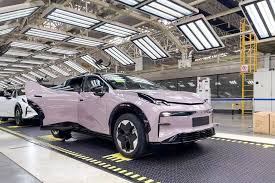Subscription required
As global competition in the electric vehicle (EV) market heats up, Chinese manufacturers are increasingly turning to Africa to expand their reach. Seeking to avoid the tariffs and import restrictions imposed by the US and Europe, these companies are making significant investments in the continent, building flagship stores and setting up assembly plants. With the rise of Chinese-made electric cars, the continent is emerging as a key market, and countries like Egypt are becoming crucial hubs for growth.
Egypt’s Growing Role in the EV Market
Two of China’s biggest players in the EV industry, BAIC Group and Zeekr (a premium brand owned by Geely Auto), are eyeing Egypt as their entry point into Africa. Egypt is strategically located at the crossroads of Africa, Asia, and Europe, making it an ideal spot for companies hoping to serve not just the local market, but also the wider region.
BAIC Group, a state-owned car manufacturer, has already set its sights on the Egyptian market. By the end of 2025, BAIC expects to produce 20,000 electric vehicles annually in an assembly plant it is establishing in the country. This number is expected to increase to 50,000 vehicles by the fifth year of production. This move comes through a partnership with Alkan Auto, a subsidiary of the Egyptian International Motors (EIM Group). The deal, which was finalized last week, was witnessed by Egypt’s Deputy Prime Minister for Industrial Development, Kamel al-Wazir, who is also the Minister of Industry and Transport. He expressed that this project aligns with President Abdel-Fattah el-Sisi’s goal of turning Egypt into a regional industrial hub and localizing the country’s car manufacturing industry.
The Egyptian government has allocated a 120,000 square-meter plot of land for this project, underscoring the importance it places on foreign investment in its automotive sector.
The Strategic Importance of Egypt
Egypt’s geographical location gives it an advantage in becoming a major player in the global EV market. It serves as a gateway between three continents, with the Suez Canal linking the Mediterranean Sea to the Red Sea, offering the shortest sea route between Asia and Europe. The Suez Canal is one of the busiest waterways in the world, handling over 10 percent of global trade each year. This strategic positioning makes Egypt an ideal manufacturing hub, with products easily accessible to the Middle East, Europe, and other parts of Africa.
In addition to its location, Egypt offers affordable labor costs. Wages in Egypt are significantly lower than in countries like Morocco and South Africa, which makes it an attractive destination for foreign investment. These lower labor costs, combined with abundant sunshine and favorable weather conditions, make Egypt an ideal place for renewable energy-related industries like electric vehicle manufacturing.
With the Egyptian government pushing to localize car production and attract foreign investments, the new plant is not just about meeting domestic demand but also about boosting exports to other African nations and the Middle East. The project is expected to create around 1,200 jobs for local workers when it begins production by the end of next year.
Zeekr’s Expansion into Egypt
Another Chinese EV maker, Zeekr, is also eyeing the Egyptian market. Zeekr, a high-end brand under the Geely Auto umbrella, signed a distributorship agreement with EIM Group in a bid to build a network for sales and services in Egypt. Zeekr plans to launch its cars in the Egyptian market before the end of this year, further solidifying Egypt’s role as a key player in the region’s EV landscape.
Why Africa? Why Now?
The move to expand into Africa is driven by a variety of factors. According to Lauren Johnston, an expert on China-Africa relations and an associate professor at the University of Sydney’s China Studies Centre, one of the main reasons for the shift to Africa is the growing challenges Chinese EV makers face in the US and European markets. Both regions have imposed tariffs on Chinese-made electric vehicles, making it more difficult for Chinese companies to compete. As a result, these manufacturers are now looking for alternative markets to secure growth and avoid trade barriers.
Johnston points out that Egypt’s strategic location and relatively low labor costs are key attractions for Chinese manufacturers. The country offers a combination of competitive wages—about half of those in Morocco and lower than those in South Africa—and abundant sunlight, which is a major advantage for renewable energy-related industries like solar-powered EV manufacturing. Additionally, Egypt is part of the African free-trade agreement area, which opens up access to a larger market across the continent. The proximity to high-income markets in the Middle East and Europe also makes Egypt an appealing location for Chinese companies looking to expand.
Global Disruptions and Supply Chain Challenges
The timing of these investments is also significant. The ongoing war in Ukraine and tensions in global trade routes have created disruptions in low-wage supply chains, especially in Europe. In recent months, attacks on commercial ships in the Red Sea by Yemen’s Iran-backed Houthi rebels have affected traffic through the Suez Canal, reducing the number of vessels passing through. These disruptions are prompting Chinese manufacturers to move production closer to key markets to avoid supply chain bottlenecks and potential trade risks.
By establishing production closer to their target markets in Africa, Chinese companies are mitigating the risks posed by global supply chain disruptions. For Egypt, these investments come at a crucial time when it is looking to revitalize its economy and position itself as a leading industrial hub in the region.
A Win-Win for Both Egypt and China
The investments made by BAIC Group and Zeekr in Egypt are mutually beneficial for both countries. For Egypt, the influx of Chinese capital means the creation of thousands of new jobs, a boost to the local economy, and a stronger presence in the automotive industry. The government’s focus on localizing production and attracting foreign investment is designed to transform Egypt into a manufacturing powerhouse in Africa and the Middle East.
For China, expanding into Africa and the Middle East allows its EV manufacturers to bypass trade restrictions imposed by the US and Europe while tapping into new markets with high growth potential. The investments in Egypt also support China’s broader Belt and Road Initiative (BRI), which aims to improve infrastructure and trade links between China and countries across Asia, Africa, and Europe.
Looking Ahead: The Future of Electric Vehicles in Africa
As more Chinese EV makers enter the African market, the continent is set to become an important hub for electric vehicle production. With low labor costs, an abundance of renewable energy resources, and strategic access to key markets in Africa, the Middle East, and Europe, Africa presents a promising opportunity for Chinese manufacturers to grow their market share.
The rise of Chinese-made electric vehicles in Africa is not only about creating jobs and boosting economies but also about making a global shift toward cleaner and more sustainable energy sources. As more countries in Africa embrace electric vehicles, the continent could become an important player in the global green energy revolution.





